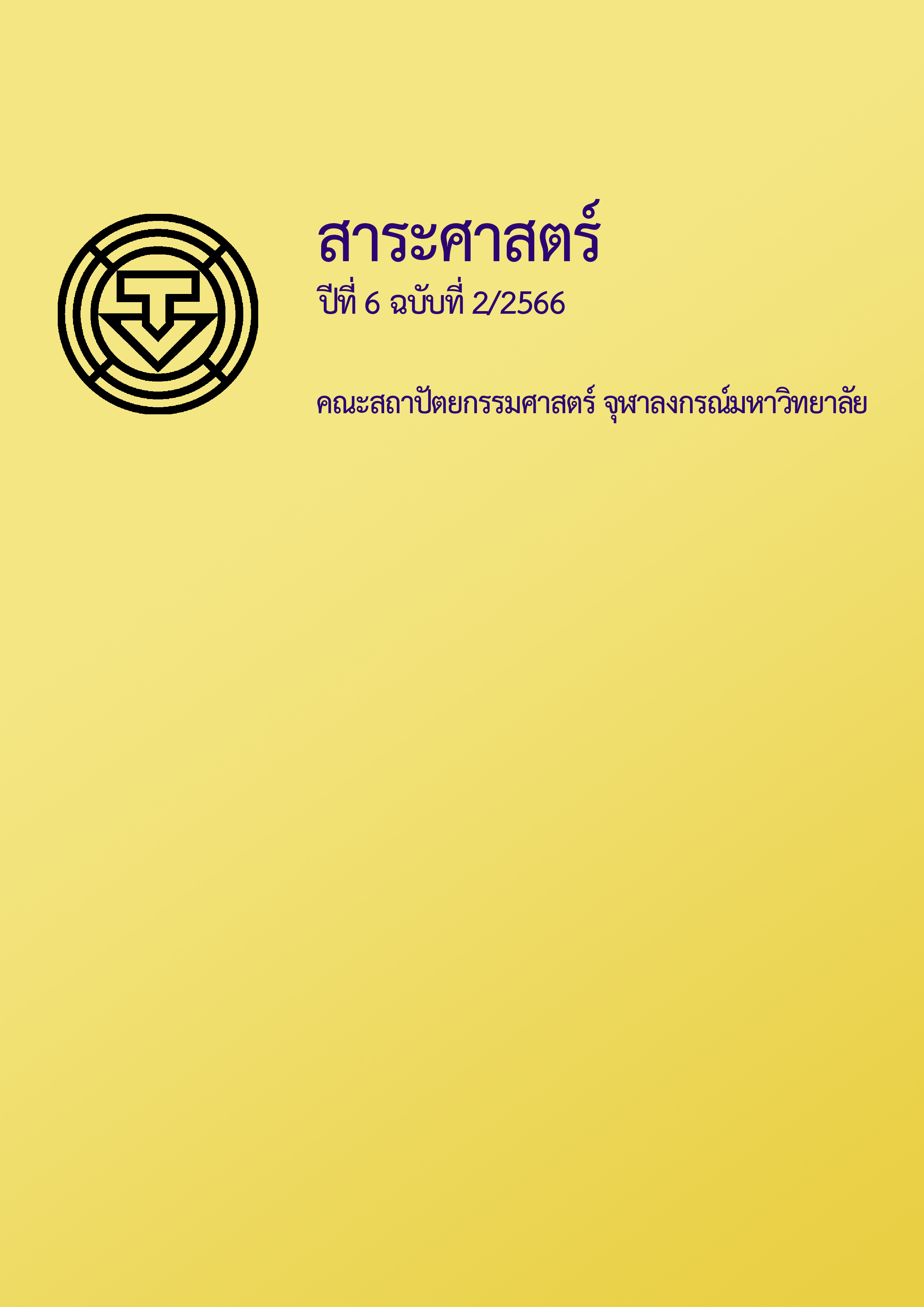Development of Tourist Accommodations Using Social Enterprise Concept: Case Studies of Chumphon Cabana Resort and Suan Sampran Hotel
Main Article Content
Abstract
Currently, an increasing number of businesses are implementing the Social Enterprise (SE) concept, which intends to benefit society and the environment. However, the implementation of this concept in the tourist accommodation sector remains limited, despite the potential for such businesses to make a significant positive impact on society and the environment. This article focuses on the implementation of the SE concept in two case studies: Chumphon Cabana Resort and Suan Sampran Hotel. Data collecting is conducted through literature reviews, field surveys, and interviews with key informants, including business owners and stakeholders. Data analysis uses a comparative analysis method and presents the findings in terms of SE components and relationships of them. Lessons learned are also derived from cases.
The study found that, firstly, both cases used the idea of SE as the core concept for their business, despite having different starting points. Chumphon Cabana Resort, for instance, utilized this idea to tackle its debt issues, while Suan Sampran hotel used it to create a sales opportunity. Secondly, the SE concept implemented by both tourist accommodations included five main activities: (1) providing knowledge management support to stakeholders i.e., farmers and hotel staff (2) purchasing agricultural products from farmers at fair prices, (3) adding value to agricultural products through business production, (4) providing markets and distributing agricultural products, and (5) sustainable tourism development support. Lastly, the stakeholders involved in the development of the projects can be divided into three main groups: (1) primary businesses, including tourist accommodation, social enterprises, tourism service providers, restaurants, and markets; (2) beneficiaries, whose roles vary according to the context and environment of the location; and (3) supporters from various sectors, including government, education, civil society, private sector, and the general public.
The study reflects that the development of SE tourism accommodation projects in both cases has significant impacts on stakeholders and society. The lessons learned are key success factors: the intention and understanding of development owners who have the strategic planning for change. Furthermore, the stakeholders’ participation will be included in the SE process. This research can serve as a guide for tourism entrepreneurs interested in applying the concept of social entrepreneurship in their development projects.
Article Details
References
คณะกรรมการศึกษาและจัดทำรายงานเรื่อง “วิสาหกิจเพื่อสังคม” พร้อมร่างกฎหมายสภาปฏิรูปแห่งชาติ. (2558). รายงานการศึกษาวิจัย เรื่อง “วิสาหกิจเพื่อสังคม” (Social Enterprise) และร่างพระราชบัญญัติส่งเสริมวิสาหกิจเพื่อสังคม พ.ศ. .... คลังสารสนเทศของสถาบันนิติบัญญัติ.
ธณัชธันย์ พพิธิธนสิน. (2557). กระบวนการพัฒนาโรงแรมบูติคที่มีกิจการเพื่อสังคม [วิทยานิพนธ์ปริญญามหาบัณฑิต ไม่ได้ตีพิมพ์]. จุฬาลงกรณ์มหาวิทยาลัย.
วนารัตน์ อิ้มพัฒน์. (2559). ความแตกต่างระหว่างการพัฒนาที่พักประเภทโฮสเทลที่มีแนวคิดเชิงธุรกิจกับที่มีแนวคิดธุรกิจเกื้อกูลในเขตเมืองเก่ากรุงเทพมหานคร : กรณีศึกษา โครงการ เฮีย โฮสเทล และ วันซ์ อะเกน โฮสเทล [วิทยานิพนธ์ปริญญามหาบัณฑิต ไม่ได้ตีพิมพ์]. จุฬาลงกรณ์มหาวิทยาลัย.
วิษฬาห์ ชีวะสาธน์. (2549). บทบาทขององค์กรธุรกิจในการส่งเสริมการประยุกต์หลักเศรษฐกิจพอเพียงในการพัฒนา : กรณีศึกษา ความร่วมมือระหว่างชุมชนสะพลี กับ ชุมพรคาบาน่ารีสอร์ท [วิทยานิพนธ์ปริญญามหาบัณฑิต ไม่ได้ตีพิมพ์].จุฬาลงกรณ์มหาวิทยาลัย.
สมาคมธุรกิจเพื่อสังคม. (2562). ธุรกิจเพื่อสังคม (SOCIAL ENTERPRISE: SE) คืออะไร. https://www.sethailand.org/resource/what-is-social-enterprise-se/
สมาคมธุรกิจเพื่อสังคม. (2564). “ธรรมธุรกิจ” ธุรกิจเพื่อสังคมที่ใช้ธรรม มานำการทำธุรกิจ ให้เป็นธรรมทั้งผู้ผลิตไปจนถึงผู้บริโภค | SE STORIES ตอนที่ 7. https://www.sethailand.org/resource/thamturakit/
สวนสามพราน. (ม.ป.ป.). https://suansampran.com
สำนักงานส่งเสริมวิสาหกิจเพื่อสังคม [สวส.]. (2566). Se และผู้สนับสนุน SE จะได้รับสิทธิประโยชน์ทางภาษีอะไรบ้าง? https://www.osep.or.th/se-และผู้สนับสนุน-se-จะได้รั/
เสาวลักษณ์ ลิ้มสวัสดิ์. (2562). การพัฒนาที่พักนักท่องเที่ยวที่มีกิจกรรมเกี่ยวเนื่องกับชุมชนแวดล้อมในจังหวัดฉะเชิงเทรา : กรณีศึกษา โครงการเดวารีสอร์ทโครงการสวนปาล์มฟาร์มนกรีสอร์ท และ โครงการบางปะกงโบ๊ทคลับแอนด์รีสอร์ท [วิทยานิพนธ์ปริญญามหาบัณฑิต ไม่ได้ตีพิมพ์]. จุฬาลงกรณ์มหาวิทยาลัย.
อรุณวรรณ ปราบพาล. (2561). กระบวนการพัฒนาโรงแรมภายใต้หลักปรัชญาเศรษฐกิจพอเพียง : กรณีศึกษา บ้านริมแคว แพริมน้ำ รีสอร์ท จังหวัดกาญจนบุรี [วิทยานิพนธ์ปริญญามหาบัณฑิต ไม่ได้ตีพิมพ์]. จุฬาลงกรณ์มหาวิทยาลัย.
อัตพร ปุยอ๊อก. (2564). กลยุทธ์การปรับตัวของธุรกิจที่พักแรมที่ดำเนินงานภายใต้ปรัชญาของเศรษฐกิจพอเพียง ในภาวะวิกฤตโควิด-19 ระหว่าง พ.ศ .2563-2564 กรณีศึกษา ธุรกิจที่พักแรมที่ได้รับการคัดเลือกเข้าโครงการพอแล้วดี [วิทยานิพนธ์ปริญญามหาบัณฑิต ไม่ได้ตีพิมพ์]. จุฬาลงกรณ์มหาวิทยาลัย.
Clarkson, Max B. E. (1995). A stakeholder framework for analyzing and evaluating corporate social performance. The Academy of Management Review, 20(1), 92–117. https://doi.org/10.2307/258888
Freeman, R. & Mcvea, J. (2001, January). A stakeholder approach to strategic management. SSRN Electronic Journal. Doi: 10.2139/ssrn.263511.
Simmons, J. (2004). Managing in the post-managerialist era: Towards socially responsible corporate governance. Management Decision, 42(3/4), 601–611.


